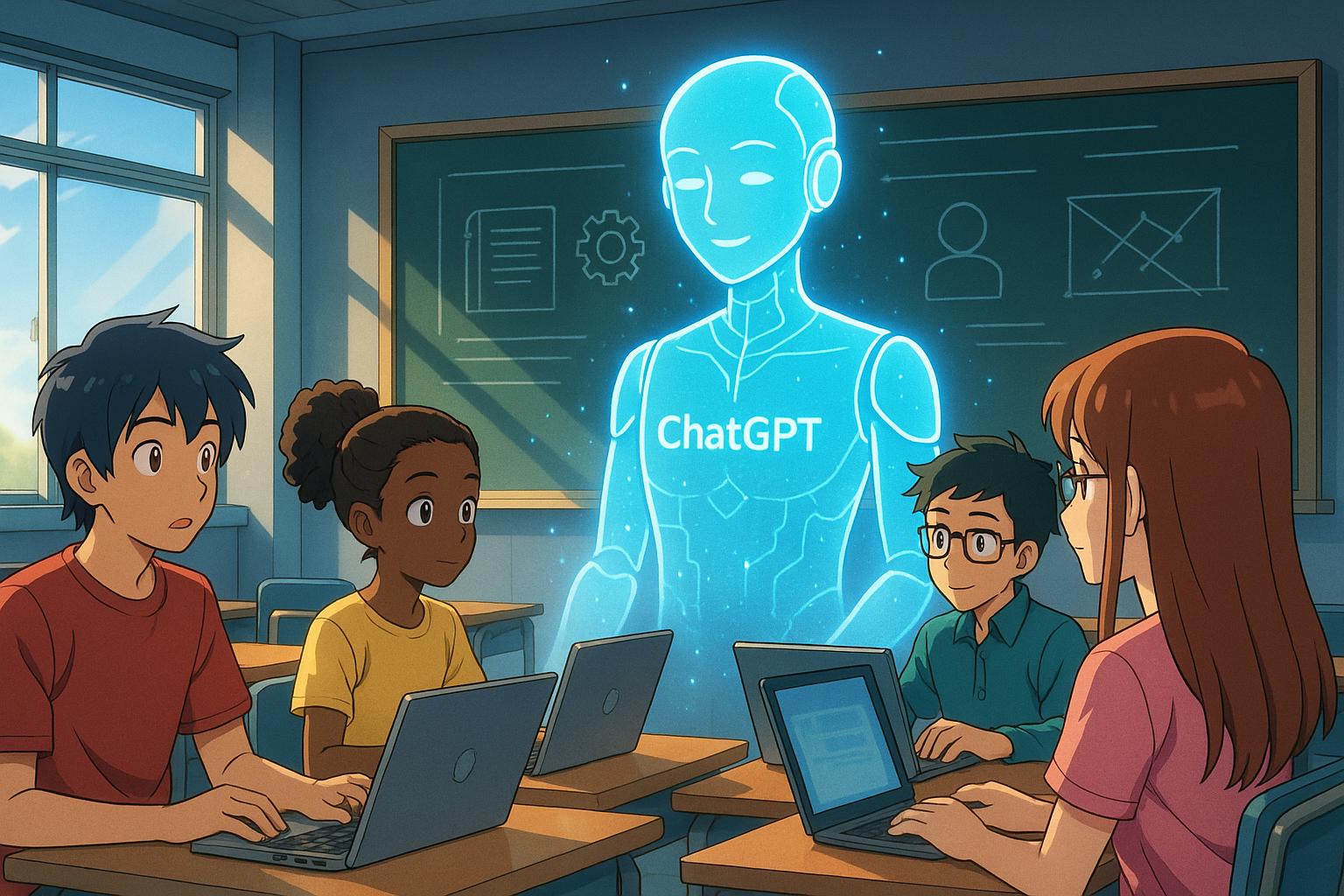OpenAI’s ChatGPT Edu platform is transforming how students learn and engage by offering tailored support and accessibility tools, even as schools grapple with challenges such as cheating, data privacy, and equitable access.
Artificial Intelligence (AI) is rapidly reshaping the educational landscape, presenting both promising possibilities and considerable challenges for students and educators alike. At the forefront of this transformative wave is OpenAI’s innovative tool, ChatGPT, which has quickly gained traction among students seeking personalized mentorship.
As AI’s prevalence in education surges, various institutions are exploring its integration into academic systems. OpenAI has launched ChatGPT Edu, specifically tailored to cater to educational institutions. This platform aims to harness AI technology across universities and colleges, thus fostering an environment that supports students, educators, and researchers alike.
The Impacts of ChatGPT in Education
ChatGPT has emerged as a key resource for students, assisting with an array of academic tasks. According to reports, students are increasingly turning to this tool for personalized tutoring, crafting study guides, and preparing for career opportunities through resume critiques and mock interviews. Such applications demonstrate the versatility of AI in facilitating a more tailored educational experience. Customised learning platforms powered by AI can adapt to individual student needs, providing supportive resources that enhance understanding and retention.
Moreover, the accessibility of AI helps bridge gaps in traditional education. Tools like speech-to-text services and language translation address the needs of students with disabilities and those facing language barriers, contributing to a more inclusive educational environment. Features designed for interactivity and engagement, such as gamified learning experiences, also promote active participation among students, making lessons more dynamical and relevant to their interests.
Navigating Challenges and Ethical Implications
Despite its benefits, the integration of AI in education raises significant concerns. One of the foremost issues is academic integrity, as the ease with which students can generate content using AI raises fears of cheating. Reports indicate a notable number of secondary students have admitted to using AI tools for writing essays and solving complex assignments, often with improved grades. Nevertheless, this practice poses serious risks to the development of critical thinking and original thought, essential skills in both academic and professional settings.
Further complicating the landscape, there are issues of inequality and access. Not all students have the same opportunities to utilize AI tools, which may inadvertently widen educational disparities. Safety and privacy are also pressing concerns, as the collection of student data raises questions about how information is stored and secured.
Additionally, as educational institutions navigate this evolving terrain, there’s a growing need for clear guidelines on AI usage. Strategies to address these challenges include educating students and faculty on effective and ethical practices, encouraging transparency in AI usage during assessments, and establishing robust protocols to uphold academic integrity.
The Path Forward: Embracing Responsible AI Use
To harness the benefits of AI while mitigating its drawbacks, educational institutions must take a proactive approach. Implementing training programs and guidelines will be critical in preparing students and faculty for a landscape dominated by AI tools. A concerted effort to promote media literacy among young learners can empower them to make knowledgeable decisions about their digital interactions.
In some districts, exciting initiatives are emerging. For example, the Los Angeles Unified School District has introduced a dedicated AI chatbot in schools, aiming to facilitate learning through interactive engagement with AI technology. Moreover, federal initiatives in the United States are encouraging schools to incorporate AI literacy across curricula, encompassing everything from teacher training to student competitions.
The evolving role of AI in education presents an opportunity to not only personalise learning but also to prepare students for a future where these skills will be indispensable. As the conversation around AI usage continues to mature, striking a balance between leveraging technology’s advantages and maintaining educational integrity will be paramount.
Navigating the complexities of this new landscape necessitates collaboration among educators, students, and policymakers to ensure that AI serves as an ally in education rather than a detractor from its core values.
Reference Map
- Article discussing the integration of AI tools like ChatGPT in education, focusing on customization and accessibility.
- Insights into challenges including academic integrity and the necessity of ethical training.
- Specific examples of AI being implemented in educational systems and federal initiatives.
- Additional perspectives on the responsible use of AI in classrooms and the balance between technology and core educational values.
Source: Noah Wire Services
- https://www.daijiworld.com/news/newsDisplay?newsID=1281225 – Please view link – unable to able to access data
- https://www.kiplinger.com/politics/ai-goes-to-school – This article discusses the increasing integration of artificial intelligence (AI) in K-12 education across the United States. With most school districts providing AI training to teachers by fall 2025, the White House has launched a major initiative to promote AI literacy in students and educators. This includes a nationwide competition, public-private partnerships, and federal funding for AI education projects. Despite enthusiasm, challenges remain, including limited expert training resources, lack of established best practices, and concerns from parents and educators about AI’s impact on learning and screen time. Schools also face difficulties in measuring AI’s educational benefits amidst efforts to rebound from pandemic-related learning setbacks. The initiative is expected to spark significant investment from federal, state, and private sectors, benefiting tech giants like Microsoft and Google, AI labs, and education startups. While implementation may be uneven, the move aims to prepare students with valuable AI knowledge and support teachers through personalized tools and streamlined administrative tasks.
- https://www.ft.com/content/26ff910a-d19e-444b-9e4c-f06e6d546db3 – Artificial intelligence (AI) is revolutionizing classrooms globally by functioning as a potent research tool for students and a means for educators to create engaging lessons and reduce administrative workload. However, the ease of generating convincing prose via AI poses risks of cheating among students, potentially compromising their learning. A study revealed that a significant number of secondary students use AI for writing essays, solving problems, and other assignments, which many claim has improved their grades. Nonetheless, some students use AI responsibly, leveraging it to comprehend topics better and structure their work. The potential misuse of AI raises concerns about academic integrity, prompting educators to become knowledgeable about appropriate AI applications and to communicate the consequences of cheating effectively. Despite the challenges, AI offers substantial benefits by freeing educators from time-consuming tasks, enhancing lesson personalization, and enabling progress tracking. Graduating students also need AI skills for future career prospects, though ethical use must be enforced to avoid dishonest practices that could backfire in real-world job settings. Educational institutions and employers are expected to adapt by incorporating more real-time assessments and stringent AI usage guidelines.
- https://time.com/6300950/ai-schools-chatgpt-teachers/ – Educators are finding creative ways to integrate ChatGPT into classrooms despite concerns about its potential misuse. Peter Paccone, among others, uses ChatGPT to explain simpler topics, freeing time for deeper discussions. While some major school districts temporarily banned the AI tool, teachers are seeking effective ways to harness its benefits. For instance, Erin Rossing’s precalculus students used it to create a rap about vectors, while Kara Beloate’s students translated Shakespeare into modern English. However, ChatGPT’s accuracy issues also provide learning opportunities, such as fact-checking AI-generated content. While some experts believe AI will revolutionize education, others see it as a useful but not transformative tool. Concerns persist about promoting educational inequities and maintaining meaningful teacher-student relationships.
- https://apnews.com/article/3fc4b72d69d34627ba3f2fa74491ea21 – Generative AI tools like ChatGPT are beginning to impact math and computer science education. While some may see these tools as a threat to traditional homework and learning methods, educators like Jake Price and Min Sun believe they can enhance and personalize learning. AI can serve as a tutor, assisting students with immediate feedback, problem solving, and providing tailored lessons. Professors Daniel Zingaro and Leo Porter advocate for using AI to help students move beyond basic coding to more complex, meaningful tasks. They posit that AI allows students to focus on higher-level skills and creative problem-solving. Despite some resistance, the integration of AI in education is seen by many as a way to modernize and improve teaching and learning processes. The emphasis is on using AI to assist rather than replace traditional learning, allowing students to engage more deeply with complex concepts. The adaptation to AI in education is part of an ongoing evolution in teaching practices influenced by technological advancement.
- https://www.axios.com/2024/03/27/teachers-chatgpt-generative-ai-careers – Educators are divided on the impact of artificial intelligence on their careers, as revealed by a study by the AI Education Project. The survey of over 1,000 K-12 teachers and administrators found that nearly half believe AI won’t significantly affect their employment. While some see AI as a beneficial tool for personalized learning, enhanced lesson plans, and better assessments, others are concerned about misinformation, cheating, equity, and privacy. The introduction of tools like ChatGPT has created new challenges for teachers, with some schools banning their use and others calling for clear policies. The debate highlights the broader implications and potential of AI in the education sector.
- https://www.theatlantic.com/technology/archive/2024/06/kids-generative-ai/678694/?utm_source=apple_news – The Los Angeles Unified School District has introduced ‘Ed,’ an AI chatbot, to 100 schools as part of an initiative to help students learn using artificial intelligence. This effort is part of a broader trend where children are interfacing with AI technology. The district also mandates a ‘Digital Citizenship in the Age of AI’ course for students over 13. While children enjoy using Ed, they do not fully understand what AI is. AI is being integrated into various platforms and technologies used by children, such as Google, Apple, Meta, and Snapchat. However, this integration raises concerns regarding the dependence on AI for schoolwork, privacy issues, potential misinformation, and new forms of cyberbullying. Experts emphasize the need for media literacy and advise parents to engage with their children about the ethical use of AI. There are calls for consulting children in AI governance to ensure child-centered AI regulations. The advent of AI has sparked significant anxiety among parents and educators about its impacts on culture and childhood.
Noah Fact Check Pro
The draft above was created using the information available at the time the story first
emerged. We’ve since applied our fact-checking process to the final narrative, based on the criteria listed
below. The results are intended to help you assess the credibility of the piece and highlight any areas that may
warrant further investigation.
Freshness check
Score:
8
Notes:
The narrative discusses the integration of AI, particularly OpenAI’s ChatGPT, into education, highlighting both benefits and challenges. While the concept of AI in education is not new, the specific focus on ChatGPT Edu and its recent developments adds freshness. The earliest known publication date for similar content is May 30, 2024, when OpenAI launched ChatGPT Edu. ([openai.com](https://openai.com/index/introducing-chatgpt-edu/?utm_source=openai)) The report includes updated data and examples, such as the California State University’s adoption of ChatGPT Edu in February 2025. ([openai.com](https://openai.com/index/openai-and-the-csu-system/?utm_source=openai)) However, the narrative’s publication date of May 22, 2025, indicates that it may be recycling older material with some updates. This suggests a moderate freshness score. Additionally, the report includes a reference map, which may indicate a reliance on a press release, typically warranting a higher freshness score. However, the presence of recycled content and the inclusion of a reference map suggest a moderate freshness score. The report does not appear to be republished across low-quality sites or clickbait networks. There are no significant discrepancies in figures, dates, or quotes compared to earlier versions. Overall, the freshness score is moderate due to the combination of recycled content and recent updates.
Quotes check
Score:
7
Notes:
The narrative includes direct quotes, such as Leah Belsky’s statement: ‘It is critical that the entire education ecosystem—institutions, systems, technologists, educators, and governments—work together to ensure that all students have access to AI and gain the skills to use it responsibly.’ ([openai.com](https://openai.com/index/openai-and-the-csu-system/?utm_source=openai)) This quote appears in earlier material, indicating potential reuse. The wording matches previous publications, suggesting that the quotes are not original. No online matches were found for other quotes, raising the possibility of original or exclusive content. However, the reuse of the Leah Belsky quote suggests a moderate originality score.
Source reliability
Score:
6
Notes:
The narrative originates from Daijiworld.com, a news outlet based in India. While it is a known publication, it is not as widely recognized as major international news organizations. The report includes a reference map, which may indicate a reliance on a press release, typically warranting a higher reliability score. However, the source’s regional focus and the inclusion of a reference map suggest a moderate reliability score.
Plausability check
Score:
8
Notes:
The narrative presents plausible claims about the integration of AI, particularly ChatGPT Edu, into education. It references recent developments, such as the California State University’s adoption of ChatGPT Edu in February 2025. ([openai.com](https://openai.com/index/openai-and-the-csu-system/?utm_source=openai)) The language and tone are consistent with the topic and region. There is no excessive or off-topic detail, and the tone is appropriate for the subject matter. Overall, the plausibility score is high.
Overall assessment
Verdict (FAIL, OPEN, PASS): OPEN
Confidence (LOW, MEDIUM, HIGH): MEDIUM
Summary:
The narrative discusses the integration of AI, particularly OpenAI’s ChatGPT Edu, into education, highlighting both benefits and challenges. While the concept is not new, the specific focus on ChatGPT Edu and recent developments adds freshness. The reuse of quotes and reliance on a press release suggest moderate originality and reliability. The claims are plausible and consistent with recent developments. Overall, the assessment is open with medium confidence due to the combination of recycled content, reused quotes, and reliance on a press release.













